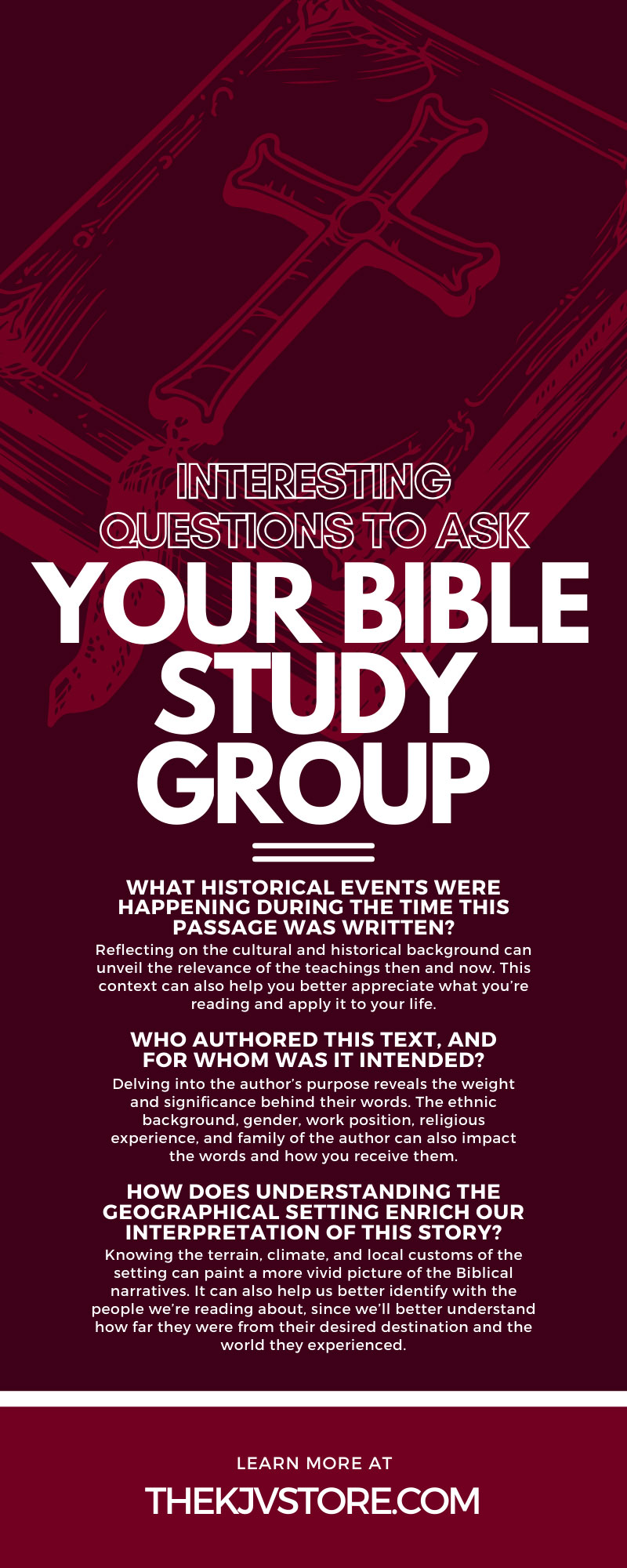Interesting Questions To Ask Your Bible Study Group

Whether you’re a devout Christian or someone who’s curious about the Bible’s teachings, stirring up a dynamic discussion at a Bible study can lead to profound insights and personal growth. However, even thinking of productive questions can sometimes be a challenge. What is appropriate to ask? How will I participate in the answer? If someone asks a follow-up question I can’t answer, will I look silly?
You can lay these worrisome questions aside. There are many interesting questions to ask your Bible study group that everyone participating won’t mind discussing and answering. As you traverse the rich tapestry of stories and teachings in the Bible, these questions will help guide you and your group through reflection, analysis, and personal application. These questions can help you seek answers and open doors to more meaningful and thought-provoking discourse.
Contextual Queries: Unraveling the Setting
The Bible is a religious book, but it’s also a historical one, and understanding the context can significantly affect how we interpret its messages. Even if you have a study Bible with historical information, you can still ask the following questions for your benefit and the benefit of others.
What historical events were happening during the time this passage was written?
Reflecting on the cultural and historical background can unveil the relevance of the teachings then and now. This context can also help you better appreciate what you’re reading and apply it to your life.
Who authored this text, and for whom was it intended?
Delving into the author’s purpose reveals the weight and significance behind their words. The ethnic background, gender, work position, religious experience, and family of the author can also impact the words and how you receive them.
How does understanding the geographical setting enrich our interpretation of this story?
Knowing the terrain, climate, and local customs of the setting can paint a more vivid picture of the Biblical narratives. It can also help us better identify with the people we’re reading about, since we’ll better understand how far they were from their desired destination and the world they experienced.
Theological Ponderings: Delving Into Doctrine
The doctrines of Christianity shape the belief system of its followers. Stirring up a theological discussion can deepen faith and clarity for everyone at your Bible study.
How does this passage reflect the nature of God?
Discuss attributes of God as seen through specific scriptures—his love, justice, forgiveness, or wrath. If you read something that seems contradictory to God’s character, discuss this as well to deepen your understanding.
Is there a promise to claim or a lesson about God’s character to learn from these verses?
Identifying and claiming promises can be an uplifting exercise for believers. Non-believers can understand what’s available to them if they choose the Christian faith.
How do different denominations interpret this scripture, and why?
This question can open a respectful dialogue on varying interpretations and promote understanding within the Christian community. Every denomination or sect of Christianity interprets scripture differently, so this question can help everyone grow.
Personal Applications: Life Lessons and Self-Reflection
The Bible also serves as a moral compass. Believers and non-believers can learn a lot from the moral lessons in this important book. Connecting Bible stories and lessons to personal experiences can help you better use this moral compass, regardless of where you fall on the faith scale.
What personal challenge or encouragement can I draw from this passage?
Encourage your group to share personal testimonials or how they relate to characters and situations in the scripture. If someone expresses a difficulty or struggle, offer encouragement.
How can I apply this teaching to my life today?
Discuss practical ways to embody the lessons you’ve learned in your modern life. Many Christians believe that the Bible is always applicable, regardless of time, so ask for help if you’re struggling to apply it. Your study group can create solutions and opportunities together.
In what ways does this passage convict or reassure me personally?
A candid sharing of convictions can lead to personal growth and community support. Remember, though, that some people are convicted or not convicted about different subjects. Always try to offer support instead of confusion or judgment.
Psychological Inspections: Understanding Character Motivations
There’s much to unearth when exploring the minds of Biblical characters. As we better understand these characters, we can better understand the whole Bible and ourselves.
What do you believe motivated this character’s actions?
Deep dives into the psychology of a character can lead to vibrant discussions and varied interpretations. While we can’t know for sure what each character’s motivations were, discussing them can help us dive deeper into the scripture.
What can we learn from the successes and failures of these individuals?
Emulate the virtues and learn from the vices of Biblical personalities. Since some parts of the Bible are letters rather than stories, you can also focus on the virtues and vices of the writer and the letter recipients.
If you were in this character’s shoes, how would you have responded differently?
Encourage empathy and self-reflection, connecting ancient struggles with modern ones. You can also turn the question around and ask how this character would respond at a different time, such as ours. This discussion can help you understand and connect with the passage.
Eschatological Insights: End Times and Prophecy
The prophetic and apocalyptic sections of the Bible are some of the most interesting and confusing. If you want to learn more, ask questions.
What does this prophecy or parable tell us about the end times?
Speculation about eschatology, or the study of the end times, is an intriguing and controversial yet essential part of Biblical studies. Ask your group members questions so that you can all study together.
How does this book of prophecy build upon or differ from previous prophetic scriptures?
Identifying patterns or deviations in prophetic writing can lead to a richer understanding of biblical foreshadowing and fulfillment. Consider writing the patterns or differences down to better keep track to discuss them.
What signs or symbols in today’s world might relate to these prophecies?
This question bridges the ancient text with contemporary events, fostering lively debates within the group. Some Christians believe that we are in the end times, so this discussion might be long, but it’s worth it.
Consider asking your Bible study group these interesting questions during your next discussion. If you have questions when away from the group or want to help supply answers, buy study Bibles. Study Bibles contain helpful footnotes that can guide you through basic and detailed questions you may have yet to ask.

